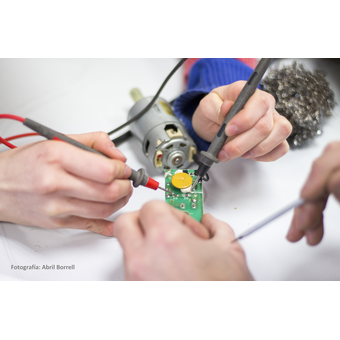Register
Event Details
CALL FOR PAPERS DISEÑA # 23: Repairing Design: Damage, Care, and Fragility
GUEST EDITORS
Blanca Callen | Universitat de Vic (UVIC-UCC) | blanca.callen@uvic.cat
Melisa Duque Hurtado | Monash University | melisa.duque@monash.edu
Submission deadline: March 6, 2023
Expected publication date: August 2023
Repairing all kinds of objects, infrastructures, devices, and services involves coming face to face with tensions, failures, wear, breakage, and the passing of time that runs through all matter. Repairing also implies confronting the harmful consequences of past design decisions, the 'after' time, from a position that was historically invisible but has recently been recognized as both creative and innovative.
The practice of repair, while presenting clear differences depending on whether it is exercised from global Souths or Norths, disputes the material and functional limits of design and circumvents its temporal interruptions to expand the life of its products towards unforeseen futures. Repair thus challenges the unity and ontological fixation of things and relocates them in a continuous state of prototyping that allows us to better understand them in order to re-design them, through the opening, reconnection, alteration, and of the heterogeneous elements that constitute them.
Precisely because of the place that repair occupies in relation to the effects derived from design (repair-led designing) and the useful knowledge that is activated from that place, we consider it relevant and necessary that design can also reflect on and revise its own practices and products from and for repair (design-led repairing). That is, with this call for papers we propose to consider repairing as a heuristic from which to interrogate the semiotic-material production of the world, a privileged position or point of view that promises 'better visions' about how contemporary material cultures are created, broken, and adjusted to be able, then, to interrogate ourselves about the possibilities of designing-repairing and/or repairing-designing: To collectively explore how the practice of repair permeates design and its disciplinary boundaries, challenging, expanding, or recreating its hegemonic methods, agencies, temporalities, spaces, concepts, pedagogies, or objects. Or how repair, even from diverse disciplinary fields, can become an epistemic and political ally of design through complicit and generative links that better prepare us to avoid or respond to present and future eco-social damages.
Topics of interest include (but are not limited to):
- Encounters: ruptures, infrastructures, contingencies, tensions, everyday life, margins, contradictions, distances, absences, values, ontologies.
- Concepts: theoretical, methodological, practical, speculative, critical, ethical, and political dialogues; resistance, care, aesthetics, epistemologies.
- Methods: openings, diagnoses, prototypes, tools, procedures, techniques, changes, improvisations, collaborations, interventions, pedagogies, results, evaluations.
- Temporalities: life cycles, longevity, durability, obsolescence, origins, futures, imagined temporalities, continuities, sustainability.
- Agents: practitioners, relationships, places, organizations, autonomies, actions, gestures, movements.
- Things: materialities, markets, services, resources, more-than-human.
***
Submit your manuscript through this platform by March 6, 2023.
Contributions written in English or Spanish will be accepted. Please read the instructions for authors.
SUBMISSION GUIDELINES (KEY POINTS)
Please read the instructions for authors.
Submissions must include:
— An English or Spanish language contribution of 3,500- 4,000 words, with references in APA Style (7th ed.).
N.B. the text should be anonymized for blind peer-review. Please, upload Word documents (not PDF).
— An abstract (140 words max.).
— Five keywords
— A personal profile of each author (150 words max.).
After peer-review, corrections will need to take place in May 2023. The issue will be published in August 2023.


